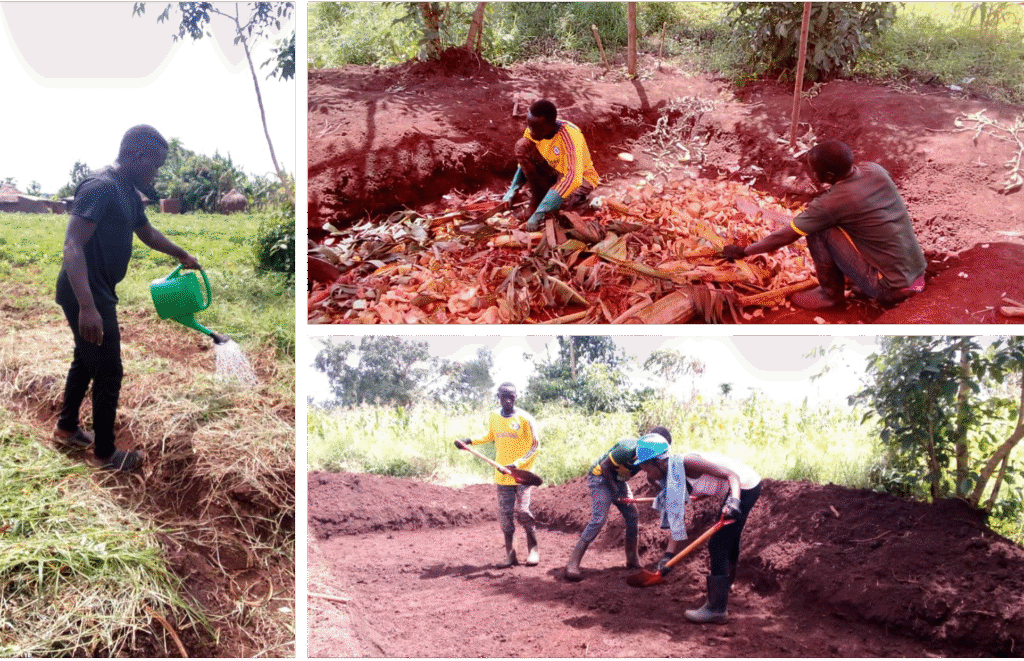
The Problem and Motivation Behind
“We saw the world being affected by so many things—global warming, soil degradation, and the excessive use of chemical pesticides, which harm both the soil and human health,” Paul.
Paul Edema (24-year-old) and his fellow members of the Divine Mercy Group witnessed first-hand how chemical fertilisers were destroying soil structure, reducing crop yields over time, and even contaminating food. “Long ago, people could live longer, but today, health issues like kidney problems are on the rise—probably because of the food we eat,” Pauladds.
Chemical fertilisers and pesticides also contribute to climate change, releasing nitrous oxide into the atmosphere. This made the group determined to find an alternative. Organic manure, made from natural waste like animal dung and compost, restores soil fertility, protects water sources, and reduces greenhouse gas emissions. “We knew we had to act—not just for ourselves, but for future generations. That’s how the idea of making organic manure was born,” says Paul. Therefore, they decided to explore producing organic manure alternatives. It was about more than just farming—it was about protecting the environment, improving public health, and creating employment opportunities for young people in their community.
The Innovative Solution
“We’re not just producing organic manure … We’re pioneering a new way of farming that protects both people and the planet.” Paul.
The Divine Mercy Group developed a process to produce high-quality organic manure using local and affordable materials. They begin by collecting animal waste and organic matter, such as kitchen waste and crop residue. These materials are then subjected to controlled composting techniques to ensure proper decomposition. Once the composting process is complete, the resulting organic manure is stored and packaged for easy distribution and use on farms. Unlike chemical fertilisers, their organic manure increases soil nutrients naturally, ensuring sustainable farming for years to come. Farmers using their manure have already reported improved soil quality, healthier crops, and better yields. Additionally, organic manure is more affordable and accessible compared with chemical fertilisers. “It doesn’t require a lot of money to make, and anyone can learn how to produce it,” Paul says.
To encourage local framers to use organic manure, the group actively demonstrates the benefits of organic manure on crops, showcasing how it improves soil health and crop yields compared to chemical fertiliser. Paul highlighted how their work is changing farmers mindsets: “At first, many farmers didn’t believe in organic manure, but after seeing the results, they started coming to us for training.” They trained farmers in their community to make organic manure on their own. By sharing their knowledge and skills, they empowered more people to adopt sustainable farming practices, ultimately improving soil quality and boosting agricultural productivity.
Lessons Learned and Addressing Challenges
The Youth Innovation Lab (YIL) under the RED Project played a crucial role in supporting Divine Mercy Group to develop their project. The group received essential training and mentorship in problem-solving and community engagement, empowering them to navigate community resistance, mobilise local farmers challenges effectively. The lab also provided financial support through a seed grant, enabling them to purchase the necessary materials and equipment to scale their production. Additionally, YIL facilitated networking opportunities, allowing the group to connect with key stakeholders in agriculture and other youth innovators across Uganda. “At first, we had the idea, but we were at a lower level … We didn’t have the ladder to take us ahead. Youth Innovation Lab gave us exposure and the chance to be heard.” Paul explains. This support also brought visibility and recognition, as they had the chance to pitch their idea and gain community and district-level endorsement, further solidifying their impact and credibility.
Reflecting on their experience, Paul identified three lessons learned:
- Setting up demonstration farms to overcome scepticism: Facing initial resistance from farmers who doubted the effectiveness of organic manure, the Divine Mercy Group set up demonstration farms to showcase its benefits firsthand. By allowing farmers to see the positive impact on crops, they gradually won community trust and support. Demonstrating the effectiveness of innovative products can significantly reduce scepticism and encourage adoption.
- Getting access to grants and financial support is essential to scale up production: Lacking the funds to increase production, the group secured a grant from Youth Innovation Lab (YIL) to purchase essential equipment and materials. This external support enabled them to enhance their production capacity and improve the quality of their organic manure. Acquiring resources through partnerships and grants is essential for scaling up youth-led initiatives and achieving sustainable impact.
- Focusing on education and awareness to compete with established products: Competing with large chemical fertiliser companies was challenging. To address this, the Divine Mercy Group focused on educating farmers about the long-term benefits of organic manure. By highlighting how it improves soil health and crop yields compared to chemical alternatives, they positioned their product as a sustainable and cost-effective choice. Focusing on education and awareness can help differentiate innovative solutions from well-established competitors.
Next Steps and Future Aspirations
“We started small, but now we see our work growing beyond just us … This isn’t just a business—it’s a movement towards sustainable farming.” Paul explains their future vision. Looking forward, Paul and his team have a plan for their next steps as follows:
- Expand their production to meet growing demand.
- Set up a composting unit for large-scale organic manure production.
- Get certification from a recognised body to enhance credibility and marketability.
- Launch a full marketing campaign to reach more farmers.
- Form more partnerships with agricultural organisations and government agencies.